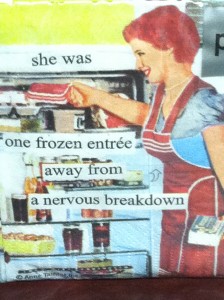It feels like Robin Williams got left in a boat without paddles and was found dead on an island before I even heard there was a search and rescue mission. I can’t believe his beautiful life and spirit which touched so many seemed inaccessible to him. I hate depression and the torment it can cause.
Someone on the news said, “Remember the work” as though not to focus on the way he died. Even if that were possible why would we do that?
When someone dies of cancer we get pink ribbons and make donations.
Look at how the A.L.S. ice-bucket challenge is making us donate money to this cause and those who suffer. Isn’t getting educated about a disease that injures or kills a loved one a way to pay tribute and prevent more loss?
The life and work of Robin Williams matters, as does his death and the disease(s) he battled.
As a culture, we hate sorrow and sadness and despise depression and suffering even more.
I lost a friend, Jason, to suicide and mental illness when I was in college. It was devastating, confusing and harrowing. Of course, it was also isolating and alienating and felt shameful at the time because of the cause of his death.
Let me be clear – I was a terrible friend.I was not there for Jason at the end. In fact, I recoiled, avoided and got afraid of his symptoms. He developed schizophrenia, in college, and I didn’t know that or what the disease is and just thought he was getting strange and bizarre and wacky.
The symptoms were unsettling and the cause of his death, shocking, disturbing and off-putting. He was young. It came out of nowhere. He had been brilliant, good-looking and kind. It made no sense at all. But death by suicide gets whispered responses or grimaces as though it’s a disease that might be contagious and so people want to pay respects but not get too close.
Me included. It was terrifying. Both when he got sick and quit school and started working at an organic farm when people doing that seemed odd. He wanted to live off the land and didn’t like college even though he was a genius.
Just another rich kid I can’t relate to I told myself. And I pulled back. Way back.
Plus, I was pissed.
We had been good friends and one of the last times he came to my house for a visit he kissed me. We had slept in the same bed together, as we often did, but this one time he more than hit on me. He tried to make the shift from friends to more kissing and touching.
I stayed still and didn’t speak. I didn’t tell him to stop or that actually, what I thought was, does anyone like me as a person not as a potential roll in the hay? I cried, silently in my bed, not aware at all of how I felt about him.
Eventually, he stopped, asked “What?” and I just rolled over. In the morning, said, “I just didn’t expect you to be such a typical fucking guy.”
He felt terrible. I had decided I wasn’t relationship material and there he went and ruined it I thought. I saw it as him ruining the friendship. 100%.
I wrote him off and out of my heart and never let him back in. Not really.
He confirmed my fears about me.
Did I explain that the pain and rage and sorrow in me, had far more to do with my childhood sexual abuse than him? No.
Did he know that it wasn’t him who betrayed me? Nope.
My step-father, who molested me, died while I was in college as well.
I buried my rage with the wrong person is what I have often thought. It’s not a mistake I can ever fix.
Grief, like trauma, can be complicated. The whole of our lives impacts the whole of our lives. We think this is a fact we can outgrow but it isn’t. We can’t. We are not unlike a tree with circles which circle other circles as the years mount.
I would love it if my trauma did not impact my behavior, choices or other people. They have. I have. It does. We do.
That’s part of the toll or as a survivor friend of mine said: “Trauma – it’s the gift that keeps on giving.”
One of the things I discovered, after Jason’s funeral, is that all the pain that caused him to suffer and die did not die with him, like his love, it was deposited in all of the people who ever loved him. We carry Jason’s memory, love and pain. We carry our pain at having been helpless too.
And I carry my regret.
Because I couldn’t help. Because I was a shit. Because I didn’t know how to hold his pain when he was alive.
I hold it now but that doesn’t help him.
One of my favorite quotes, from the front of a catalog is: “If we don’t suffer who we are – others suffer for us.” It guides me at times when I am post-traumatically stressed out.
It’s not my fault I was traumatized. It’s true. But with the exception of those who were adults when I was a child, no one else is responsible either. The people I love didn’t cause my pain. I may not always have days where I can make lemonade. But even if I’m out of sugar or ice I can try to keep from squirting lemons at others.
Sometimes I succeed. But not always.
I have caused pain because of pain and others have caused me pain because of pain. I wish I understood how we could all do this less to one another.
Jason didn’t do anything wrong to hurt me. He didn’t betray me by wanting to get sexual and closer to me. It was not him who hurt my soul but it was him who I hurt. This stays with me. Regret is punishment. I try not to sink into self-hate which helps no one. But I was an ass.
My inability to deal with, acknowledge and take responsibility for my pain caused more pain – to Jason and to myself. I can’t even say I’ve learned and never done it again.
The vows I made, after his funeral, after hearing he wrote about me in his diary and painted an image of me on his bedroom wall are not ones I can always keep. I have shut down, when afraid, and shut others out.
This isn’t a how-to-do-or-not-do-anything piece of writing.
Grief doesn’t come out wrapped up with a bow. It bleeds out. It blurs. It slips and falls before getting back up.
What is contagious is secrecy, silence and shame which all breed more of the same. We think we’re toughing it out but what causes the most pain and causes us to hurt one another – the things we don’t say.
We think we are protecting ourselves and others when we hide or defend ourselves but we often hurt others instead.
How often do we all hurt each other with the swords we have been unable to remove that still poke, and jab and injure?
If lucky, we get to ask forgiveness. Sometimes it is granted. Sometimes it is not.
Sometimes we are the ones offering forgiveness when someone approaches us. I’ve been on that side too.
I offer no answers. I feel sad. I am with my sadness.
And confusion.
How can I love people who also love me and when we are together we go into boxing rings and pummel one another? There are people with whom the kindest thing I can do is walk away from, who I can simply prevent from hurting me or themselves more. Sometimes that’s the best I can do.
It’s insufficient though. I’m baffled.
Robin Williams literally touched millions often and deeply. What a monster his pain was that it was larger and could not reach, soothe or comfort. How gruesome a disease. It kills more than terrorism yet how alert are we to the danger?
To honor his life, don’t we have to learn how we could have protected him more or what at least we don’t know about depression or addiction and say how helpless we feel? Won’t this motivate us to do more and better? Trauma is often a part of depression and addiction though I don’t know if that was true for him.
I keep watching scenes from Good Will Hunting and comedy clips. That won’t stop. But the look in his eyes or the tight, caved in postures of his body are also obvious and it feels wrong to look away from those. He was obviously battling pain and it claimed him.
I get annoyed, even angry, when reading all the “Reach out for help” posts on Facebook. To people posting to those with depression or despair, “Reach out” I want to say, “You reach out.”
 Reach out to those in your life who need you, who don’t know or believe or trust you are there. If you are not suffering, in anguish or dealing with a mental illness YOU need to reach out and make a connection. That WILL and CAN help far more than telling someone isolated or suffering to do one other thing they haven’t been able to do. Or maybe have done and found ineffective because let’s face it, while depression and addiction have some treatments, not everyone is cured without going to the mat countless times and sometimes being knocked out or just hanging on – not really living.
Reach out to those in your life who need you, who don’t know or believe or trust you are there. If you are not suffering, in anguish or dealing with a mental illness YOU need to reach out and make a connection. That WILL and CAN help far more than telling someone isolated or suffering to do one other thing they haven’t been able to do. Or maybe have done and found ineffective because let’s face it, while depression and addiction have some treatments, not everyone is cured without going to the mat countless times and sometimes being knocked out or just hanging on – not really living.
Saying reach out to someone in despair is like driving by someone hobbling with a broken leg and saying, “Just walk four blocks to the doctor’s office.” It’s the broken leg keeping the walking from happening. The person doesn’t need directions – he or she needs a ride or crutches.
Maybe you can’t stop, get out, pull over and help but yelling out the window while driving by is not helpful. It’s like offering sand instead of water at the water stations in a marathon.
It sucks not to know what to do for others (and sometimes ourselves) when best efforts, love and good intentions fail. There are people I love, who love me and we can’t connect or support each other. This is true and real and sad. But there are those we can be lifelines for and them for us and this too is true and lovely and life-saving. Sometimes, to go in the water if we can’t swim means we will only lose our lives with the desire to help. Other times our hands can pull out five or seven and it’s amazing.
The Solace of Sharing
I’ve got no cures or quick fixes but what helps me bear and manage when hit my despair attacks or post-traumatic stress is friends and free-writing. Free-writing, in groups, often with friends, where everyone write for ten minutes about anything, and shares is intimate, emotional and healing. I can unload our secrets and my burdens and struggles (and joys too) and listen to others doing the same.
I can be and bear witness, listen and speak, and unlike a one-sided therapy and cost money, it is mutually supportive and beneficial. It’s always uplifting no matter how deep, intense and “depressing” the content. People write about loved ones dead or dying, betrayals caused or inflicted as well as money woes.
Always, people find grace and humor and smile and laugh too. Always. Natalie Goldberg and Nancy-Slonim Aronie have books on how to do this with others but basically people write, without lifting hand from pen or keyboard continuously for ten or more minutes. Doing it this way keeps the critic, judge and censor away who might wonder about grammar, spelling and how I sound if I really say that.
Unlike a writing group, not everyone need be a writer, just committed to using writing as a tool knowing silence, secrets and carried griefs and trauma are burdensome to the mind, heart and immune system. And let’s be honest, sometimes our pain is burdensome to those we love and they recoil from us as we do from others.
In a free-writing group, we don’t suck each others energy or take responsibility for one another. We agree to write, listen and be present and then we go home. But before the going home people admit to being bone-tired, heartbroken, overwhelmed or exhausted and while we cheer for one another we don’t offer advice, solutions or prescriptions just support and attention. We nod. We listen. We say, “Yeah.”
Often, that’s all that is needed to immediately lighten hearts, allow tears and the energy shifts.
Why is it that we can often be more honest with people not sharing the same bed, bills or last names than those we see once or twice a week or month? Is it because we aren’t stuck in roles or relationships with competing needs? Is it because though we feel love we aren’t worried for or about in the same way?
To find people to be real with when vulnerable or hurting or raw is rare but isn’t that what allows the most healing? Once our walls and guards are down it’s easy to see the astounding beauty, grace, strength and resilience in ourselves and others. We become more spacious and perspective comes. This is hard when in a tunnel.
We are often far more interesting and multidimensional than we realize. Sometimes we need to step in, closer to others, sharing once but listening five or ten times, to others. This heals.
I can’t wait for free-writing group tonight!
In honor of Robin Williams, I promise to be more brave, to open the door and to write about grief and sorrow, to open the door and inviting others in rather than waiting for someone else to take the lead.
You Matter Mantras
- Trauma sucks. You don't.
- Write to express not to impress.
- It's not trauma informed if it's not informed by trauma survivors.
- Breathing isn't optional.
You Are Invited Too & To:
- Heal Write Now on Facebook
- Parenting with ACEs at the ACEsConectionNetwork
- The #FacesOfPTSD campaign.
- When I'm not post-traumatically pissed or stressed I try to Twitter, Instagram & Pinterest.
This a tribute to free writing! Robin Williams was larger than life. Did he really think “Life isn’t for everyone.”?????